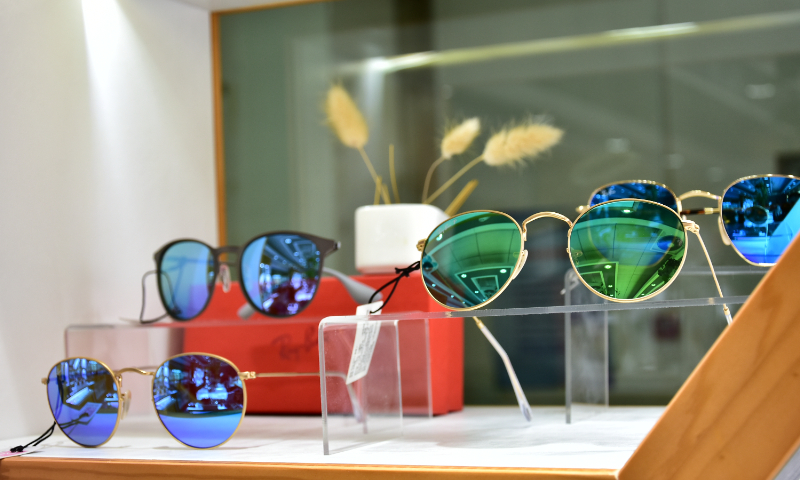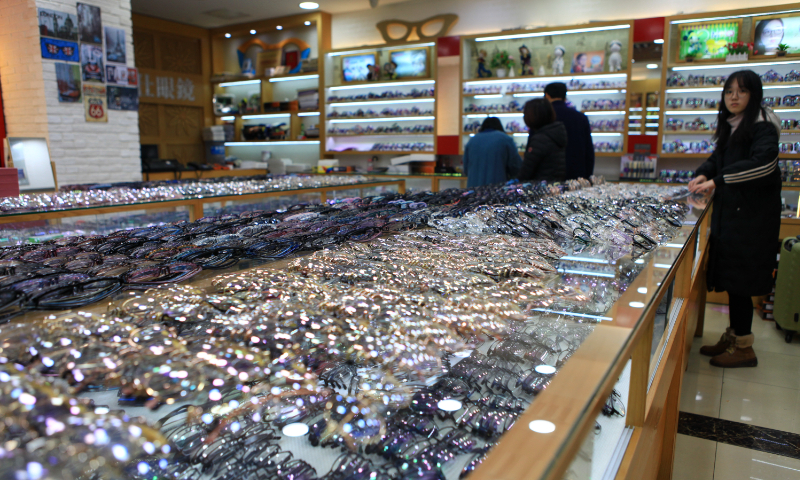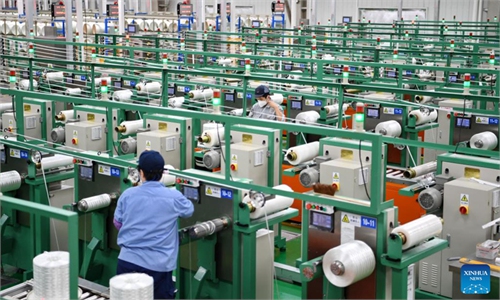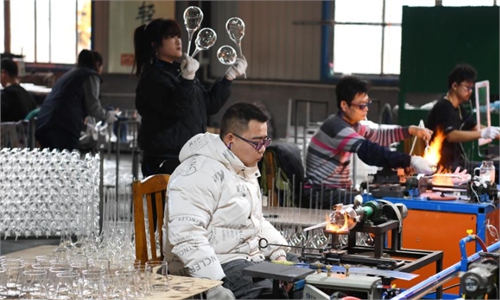Danyang city remains world's top glasses manufacturing hub, accounting for half of global industrial outcome
Steadfast self-development, tech innovation overcome foreign monopoly

A display stand for eyeglasses Photo: VCG
There is a popular saying that "one out of the two people in the world wear glasses with lenses from Danyang", East China's Jiangsu Province, known as China's "capital of glasses."
From the research and development of relevant technologies to the actual manufacturing and sales, Danyang is just a snapshot of multiple domestic cities and towns that have become famous for concentrated and specialized manufacturing, while supporting the global industrial and supply chain.
As the world's largest lens production base and the biggest eyeglass products distribution center in Asia, Danyang currently has more than 1,600 enterprises engaged in eyewear and associated sectors, official data showed.
A manufacturing hub
Data reveals that the city produces more than 400 million pairs of lenses each year, accounting for about 50 percent of the global production and 80 percent of China's total production, with an annual output of more than 100 million pairs of frames.
In 2022, Danyang exported $661-million-worth of glasses and related products abroad, growing 18.61 percent over 2021, according to a statement sent to the Global Times by the Danyang Commercial Chamber of Eyewear (DCCE).
Local industry insiders noted that the globally leading glasses manufacturing hub was established on a solid basis of continuously promoting technological innovation, industry integration and logistics improvement, as well as firm policy support from the government.
From the perspective of boosting technological innovation, Danyang has accelerated the cultivation of talent, and strengthen the construction of research, DCCE told the Global Times on Wednesday.
For instance, professional institutes covering various sectors from research to quality inspection all operate locally in Danyang, the chamber said, adding that multiple local enterprises have established their own quality-testing and R&D centers, while linking up with universities and research institutes in Shanghai and Jiangsu Province for technology cooperation.
As for industry integration, the DCCE noted that Danyang has formed a complete industrial chain with prominent advantages and a pivotal position in the global glasses industry. More than 600 eyewear manufacturers are among the aforementioned 1,600 engaged enterprises, with more than 1,000 supporting merchants and up to 50,000 employees in the industry, the chamber said.
In terms of sales promotion and distribution, the Danyang International Optical Center includes more than 1,000 retail stores. The city has also initiated specific tours targeting glasses purchases. According to incomplete statistics, the city attracts 2 million business visitors and tourists each year, and the annual sales volume of the optical center tops 6 billion yuan ($871 million).

A shop at Danyang International Optical Center in East China's Jiangsu Province Photo: VCG
Over 1,000 retail outlets
Danyang in Jiangsu Province, Shenzhen in South China's Guangdong Province, Xiamen in East China's Fujian Province, and Wenzhou in East China's Zhejiang Province are China's four major production hubs for glasses, said an industry report by iResearch Consulting Group, adding that the export of China's glasses exceeded $4 billion in 2021.
Manufacturing a pair of glasses involves several processes, and some of the technology and equipment was previously a source of bottlenecks and inefficiencies for domestic enterprises. Aiming to address these challenges, firms in Danyang have ramped up R&D efforts and overcome a traditional foreign monopoly in the sector.
Danyang-based Dingxin Machinery, a company dedicated for the development, production and sales of vacuum coating machines, developed China's first coating machine targeting glasses lens in 2014, which has broken through the monopoly held by foreign countries including Germany, Japan and South Korea, Zhang Chunlong, technical director of Dingxin Machinery told the Global Times on Wednesday.
Coating is the last procedure but also a key procedure for lens production.
"Domestic coating machines have majorly lowered the purchasing cost for glasses manufacturers," said Zhang. He noted that previous costs for importing foreign coating machines might add up to three to six million yuan from South Korea and Japan, while the sales price for coating machines from Dingxin remain at merely 1.25 to 1.30 million yuan.
Zhang added that the operating and maintenance costs have also been efficiently utilized as imported coating machines may require foreign professionals to maintain and fix the machines with additional costs because of expensive import from abroad.
Meanwhile, Zhang said that the domestic designed coating machines can better meet Chinese consumers' increasing demand for improved product quality, and design dedicated machines for clients based on their own technological needs.
Dingxin has been deploying in exporting machines to overseas markets, with products such as parts already being exported to Pakistan, India, Malaysia, and Egypt, Zhang said.
In addition to coating machines, Danyang-based enterprise Gongda Jinkai High Value Manufacturing Ltd achieved breakthroughs in lens-related production equipment and technologies, and relevant technologies have broken the absolute monopoly of foreign equipment manufacturers, the company said on its website.



